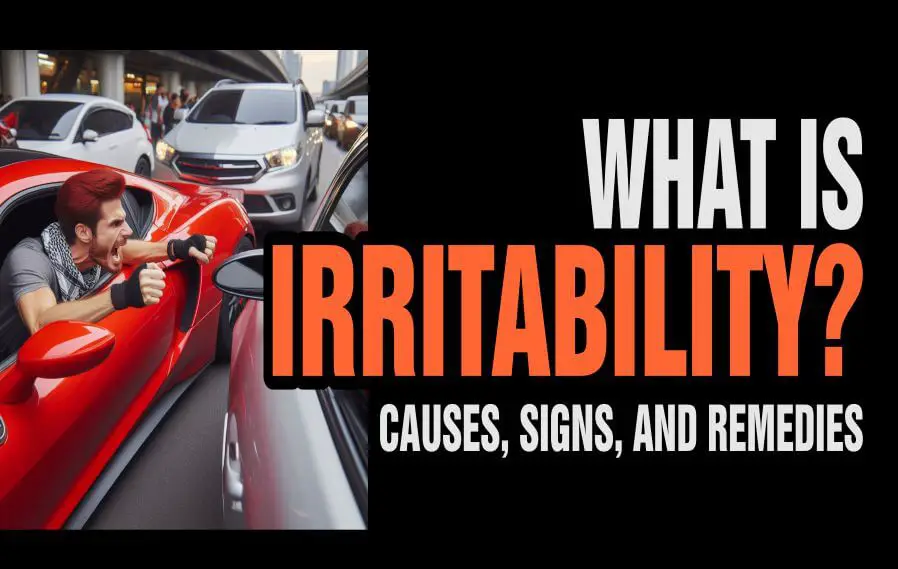Last updated on March 8th, 2025 at 05:25 am
Get the question “What is irritability?” answered, and discover effective strategies to curb its effects and improve your well-being.
Get the question “What is irritability” answered, and discover effective strategies to curb its effects and improve your well-being.
Irritability is a common result of human emotions, characterized by a heightened state of sensitivity or easily provoked annoyance.
While occasional irritability is a normal response to stress or certain situations, chronic and excessive irritability can have a profound impact on your overall well-being.
This article aims to shed light on what irritability is, its potential causes, and the detrimental effects it can have on your mental, emotional, and physical health, and we have tips to curb it.
Irritability goes hand in hand with impatience as it is one of the physical manifestations of loss of emotional control, an indication that you have lost grip on your emotions.
Table of Contents
- What is Irritability?
- What is Extreme Irritability?
- Anxiety and Irritability
- Signs of Irritability
- What Causes Irritability?
- The Impact of Irritability on Overall Wellbeing
- Coping Strategies and Management
- Where to Get Online Help for Irritability
- Frequently Asked Questions
- Final Thought
What is Irritability?

Irritability generally is a state of being easily agitated or prone to reacting negatively to various stimuli.
It may manifest as impatience, restlessness, grumpiness, or frustration towards individuals, events, or even yourself.
Irritability can range from mild annoyance to explosive outbursts, depending on the individual and specific triggers.
What is Extreme Irritability?
Extreme irritability, also known as irritable mood, is a psychological state characterized by intense frustration, restlessness, and a heightened sensitivity to irritating stimuli.
Individuals experiencing extreme irritability often find it difficult to control their emotions and may display impulsive or aggressive behavior.
This condition can be associated with various mental health disorders such as bipolar disorder, borderline personality disorder, or attention deficit hyperactivity disorder (ADHD).
It is important to note that extreme irritability can significantly impact your quality of life and relationships.
Seeking professional help and treatment options, such as therapy and medication, can be beneficial in managing this condition.
Anxiety and Irritability
Anxiety is a psychological condition characterized by excessive worry, fear, and apprehension.
People with anxiety may experience physical symptoms such as rapid heartbeat, sweating, and tense muscles.
This heightened state of arousal can lead to irritability, as individuals may feel on edge, easily angered, and quick to react negatively to small triggers.
On the other hand, as described in the definition, irritability is a common emotional response to anxiety, as constant worry and stress can drain your energy and patience.
It is important to address both anxiety and irritability as they can impact your mental well-being and relationships, and seeking professional help or practicing relaxation techniques may be beneficial in managing these symptoms.
Also Read: Life Hacks For Stress Reduction And Relaxation
Signs of Irritability
According to Mayo Clinic, stress symptoms may be affecting your health silently, causing all sorts of harm without you knowing.
Irritability isn’t just about being in a bad mood, it can sneak up in different ways, affecting how you react to people, situations, and even your environment.
If any of these signs sound familiar, it might be time to take a step back and see what’s triggering your frustration.
1. You Lose Patience Faster Than Usual
Small delays, minor mistakes, or people moving too slowly can set you off. When things don’t go your way, you feel frustration bubbling up much quicker than before.
2. You Snap or Lash Out More Easily
A simple question or harmless comment feels irritating. You catch yourself responding with sharp words or even picking fights over things that wouldn’t normally bother you.
3. Everyday Noises and Lights Feel Overwhelming
Sounds, lights, or even crowded spaces feel unbearable. What used to be background noise now grates on your nerves, making it hard to relax or focus.
4. Your Focus Feels Scattered
Irritation makes concentrating harder. Whether it’s work, conversations, or simple tasks, your mind keeps drifting to what’s bothering you, leaving you feeling stuck and unproductive.
5. Your Body Feels Stiff and Tense
Stress and frustration don’t just stay in your head. A tight jaw, tense shoulders, or frequent headaches might be your body’s way of holding onto irritation.
6. You Feel Restless or On Edge
There’s a lingering feeling that something isn’t right. Even in calm moments, you struggle to relax, and everything around you seems more annoying than usual.
What Causes Irritability?
The causes of irritability can be environmental, emotional, or psychological. Buoy Health reiterated 8 causes of irritability and how to curb them.
Here are what might be causing your nerves to rack unnecessarily and what you can do.

Numerous factors can contribute to irritability including psychological, physical, environmental, lifestyle, and interpersonal factors.
Let’s take a closer look.
Psychological Causes of Irritability
Psychological causes of irritability include stress, anxiety, and depression, which can lower emotional tolerance and make you more easily triggered.
Sleep disturbances or poor sleep quality also contribute, leaving you tired and on edge.
Chemical imbalances, particularly in serotonin and norepinephrine, can affect mood regulation.
Frustration from unmet needs or expectations increases irritability, as does having a personality prone to neuroticism.
Lastly, substance abuse or withdrawal can disrupt brain chemistry, further worsening irritability.
Identifying and addressing these underlying psychological factors can help manage irritability more effectively.
2. Physical Factors that Causes Irritability
Physical discomfort arising from medical conditions like chronic pain, hormonal imbalances, or medication side effects can amplify irritability levels.
Let’s take a look:
Neurotransmitter imbalances, like low serotonin or dopamine, can cause irritability by disrupting mood regulation.
Hormonal fluctuations, especially during PMS, pregnancy, or menopause, also contribute to irritability.
Nutrient deficiencies, such as low B vitamins, magnesium, or omega-3s, affect brain function and mood stability.
Chronic pain from conditions like arthritis can lead to frustration. Certain medications or substances, including antidepressants or drug withdrawal, can have irritability as a side effect.
These physical factors may not solely cause irritability but can contribute to psychological and environmental influences.
Related: How Emotions Shape Thoughts and Behaviours
3. Environmental Factors that Causes Irritability
Overstimulation from loud noises, crowded spaces, or chaotic environments can trigger irritability.
Additionally, exposure to excessive heat, extreme weather conditions, or air pollution may contribute to irritability.
Let’s take a look:
Constant exposure to noise, like traffic or loud music, can increase stress and irritability.
Poor air quality from pollutants, such as smog and car fumes, negatively impacts your mood.
Extreme temperatures, whether too hot or cold, can make you uncomfortable, draining energy and heightening frustrations. Crowded spaces lead to stress, as lack of personal space creates discomfort.
Harsh lighting strains eyes and disrupts sleep, making you irritable. Social factors like work stress, family tension, and lack of support can worsen irritability.
Lastly, uncomfortable living conditions, like cramped spaces and poor ventilation, add to stress, making relaxation difficult and frustration high.
The Impact of Irritability on Overall Wellbeing

The repercussions of chronic irritability extend far beyond momentary discomfort.
Its effects permeate various aspects of overall well-being. Let’s examine them:
Mental Health: Irritability often coexists with mental health disorders such as depression, anxiety, or personality disorders. It can worsen symptoms, decrease coping skills, and hinder mental health recovery. Persistent irritability can also strain personal relationships, leading to social isolation and feelings of loneliness.
Emotional Health: Frequent irritability can disrupt emotional regulation, making it difficult to control anger or negative emotions. This can lead to emotional exhaustion, heightened stress levels, and a general decline in emotional well-being.
Physical Health: Chronic irritability can have detrimental physical effects, ranging from increased blood pressure and heart rate to tension headaches, muscle pain, and digestion issues. Additionally, poor sleep quality resulting from heightened irritability can compromise overall physical health.
Quality of Life: Regular irritability can adversely affect daily functioning, impacting performance at work or school and hindering personal relationships. It can limit social interactions, lower productivity, reduce self-esteem, and overall diminish the quality of life.
Coping Strategies and Management
Dealing with chronic irritability requires a holistic approach focused on self-care and developing healthy coping mechanisms.
Some strategies to manage irritability include:
Identifying Triggers: Understanding the specific situations or stimuli that provoke irritability can help manage and avoid them whenever possible.
Self-awareness and Acceptance: Acknowledging and accepting your irritability as a genuine concern enables a proactive approach towards finding suitable coping mechanisms.
Stress Management Techniques: Incorporating stress-reducing activities such as exercise, mindfulness, deep breathing exercises, or engaging in hobbies can help alleviate irritability.
Healthy Lifestyle Choices: Adopting a balanced diet, getting adequate sleep, reducing caffeine and alcohol consumption, and increasing physical activity can significantly impact irritability levels.
Seeking Professional Help: If irritability persists or significantly affects daily life, seeking support from a mental health professional can offer guidance, therapy, or medication when necessary.
Where to Get Online Help for Irritability
If you are experiencing irritability and need online help, there are several resources you can turn to.
Here are a few options (not in order of importance):
1. Mental Health Websites
Numerous websites focus on mental health and offer resources on various issues, including irritability.
Websites like HelpGuide, Verywell Mind, and PsychCentral provide informative articles, self-help guides, and tips to manage irritability.
2. Online Therapy Platforms
There are various online therapy platforms where you can connect with licensed therapists conveniently.
Services like BetterHelp, Talkspace, and Amwell offer therapy sessions through video calls, phone calls, or messaging.
You can discuss your irritability with a professional and receive guidance and support tailored to your needs.
3. Support Forums and Communities
Online forums and communities dedicated to mental health can be a valuable source of support.
Websites like Reddit have dedicated subreddits where people share their experiences and seek advice.
Examples include r/mentalhealth, r/anxiety, or r/depression.
You can find specific subreddits related to irritability and connect with others who may have similar struggles.
4. Mental Health Apps
Many smartphone apps are designed to assist with mental well-being.
Apps like Calm, Headspace, and MoodPath offer meditation exercises, mood-tracking features, and coping mechanisms for irritability. They can provide daily support and guidance to manage your emotions effectively.
5. Online Counseling Services
Some organizations provide free or low-cost counseling services remotely.
Websites like 7 Cups, which offer listeners who provide emotional support, or Crisis Text Line, which allows you to text with trained volunteers during times of distress, can be beneficial in managing irritability.
Frequently Asked Questions
What is the irritability meaning?
Irritability refers to an increased likelihood of responding irritably or negatively to stimuli, often due to heightened sensitivity.
What is irritability biology?
Irritability in biology refers to a physiological response to stimuli, often involving neurotransmitter imbalances, hormonal changes, or other physical factors.
What does it mean to be irritable?
To be irritable means to be easily provoked into anger, impatience, or frustration, often resulting in a heightened emotional response to stimuli.
What is the meaning of irritability in the body?
In the body, irritability refers to a state of exaggerated sensitivity to stimuli, potentially leading to increased reactivity and emotional responses.
Final Thought
Irritability, while a common and often transient emotion, can have harmful effects on overall well-being when it becomes chronic and excessive.
Recognizing its causes and implementing effective coping strategies is crucial in managing irritability and preventing its detrimental impacts on mental, emotional, and physical health.
By prioritizing self-care and seeking support when needed, you can enhance your overall well-being and restore emotional balance.
Pious Clements is the insightful voice behind "The Conducts of Life" blog, where he writes about life ethics, self-development, life mastery, and the dynamics of people and society.
With a profound understanding of human behaviuor and societal dynamics, Pious offers thought-provoking perspectives on ethical living and personal growth.
Through engaging narratives and astute observations, he inspires readers to navigate life's complexities with wisdom and integrity, encouraging a deeper understanding of the human experience and our place within society.

